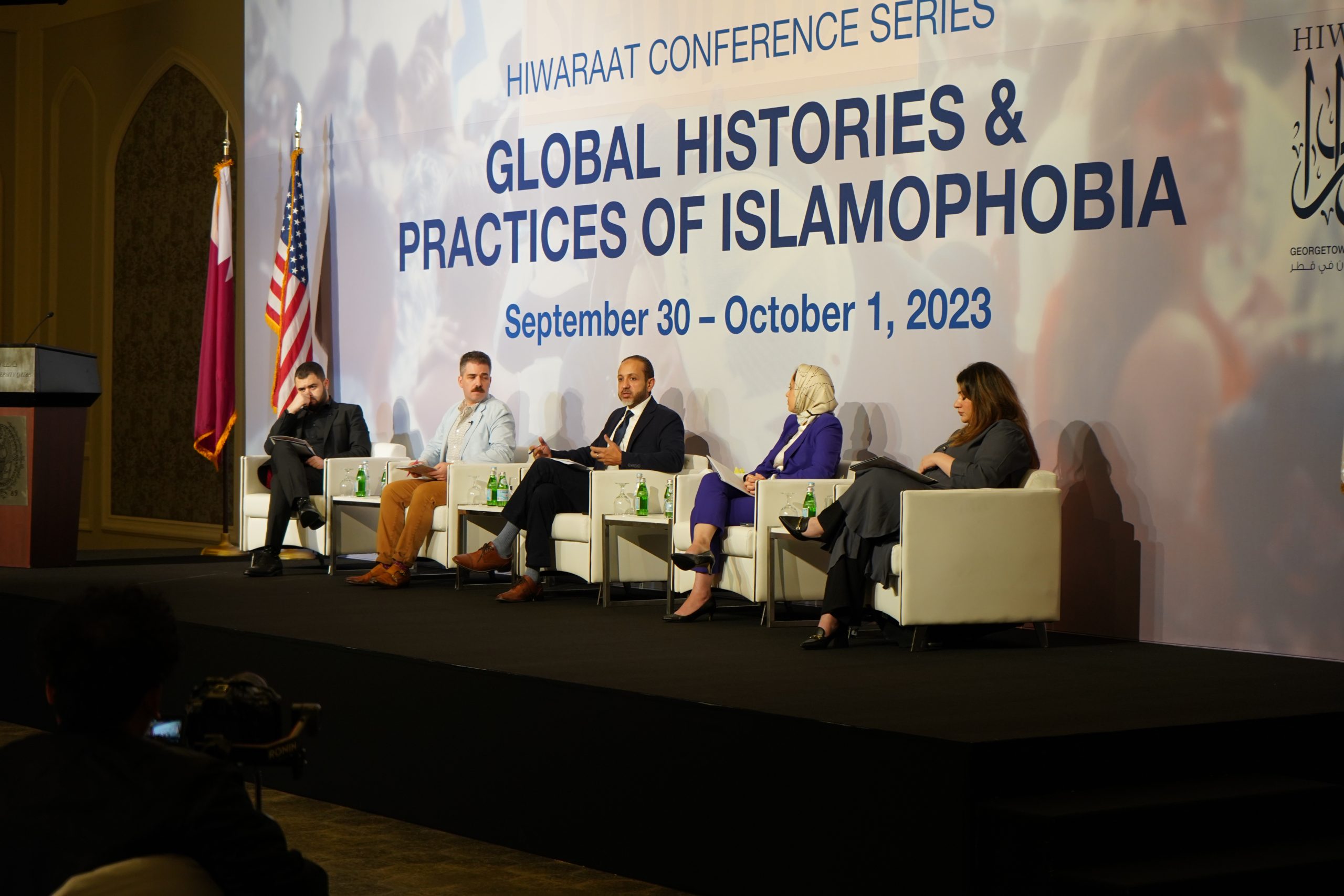Scholars and experts from around the world converged in Doha to discuss the many faces of Islamophobia.
The systemic nature of Islamophobia, its media perpetuation, holding enablers accountable, and the need to redirect questions about racialised players were some of the key topics discussed at a pivotal conference held by Georgetown University in Qatar on Sunday.
Scholars, academics, and prominent journalists from across the globe gathered at the event, which is part of the Hiwaraat Conference Series that is set to run until 1 October.
The two-day conference on Islamophobia provided a platform for insightful discussions on the pervasive issue, spanning various aspects of society and the global discourse.
The role of media in perpetuating Islamophobic narratives and its connection to government policies that shape public perception was a topic heavily addressed during a panel discussion at the conference titled ‘Global Histories and Practices of Islamophobia’ and organised by GU-Q faculty members Dr Karine Walther and Dr Abdullah Al-Arian, both holding the position of Associate Professors in History, along with Dr Firat Oruc, an Associate Professor in Culture and Politics.
“Islamophobia is both systemic and institutionalised […] which could not exist without a media that falls in line with government policy,” said Laila Al Arian, Executive Producer for Al Jazeera English documentary series Fault Lines.
She noted use of language in media when painting a certain group plays a major role in the portrayal of that group in the public narrative.
Panellists said the choice of words, phrases, and narratives used in media significantly influences how the public perceives and understands Muslims and to their dismay, this language is dominantly negative and paves the way for an increase in attacks worldwide.
“The truth is it’s much easier to paint Islam as an inherently violent religion oppressive to women because these are old ideas that confirm the audience’s worst biases and what journalists leave out in the reporting, exposes their blind spots,” Al Arian said during the panel discussion titled ‘Constructing the Narrative: Islamophobia and the Media’.
“Given the instability, chaos, violence and power vacuum that came with the US occupation of Iraq and overall destabilisation of the region, is it any wonder that a group like ISIS would emerge?”
“But a feature of reporting at this time is that it left out the context in which these groups rose in favour of sensationalist reporting that centred Islam,” excluding the actual cause which the is the US war on Iraq, she added.
Western media outlets have long used xenophobic and orientalist tropes to depict Arabs and Muslims in a negative light. Many of these narratives are shared by state officials, inevitably setting in motion a wave of violence and hatred towards members of these communities.
In October last year, the foreign policy chief of the EU faced a barrage of global criticism after describing Europe as a garden of political freedom and economic prosperity, in contrast to the rest of the world, which he dubbed a “jungle”.
“Europe is a garden,” Borrell said in a speech in Belgium. However, “most of the rest of the world is a jungle, and the jungle could invade the garden,” he added.
Years earlier, similar language was used by former United States President George Bush, who regularly threw around words such as “terrorists” operating in “deserts” and “jungles,” and in turn helped fuel an orientalist lens that has prevailed in western narratives of the Middle East.
In a separate panel, the focal point shifted towards the issue of Muslims being targeted negatively in sports media coverage, particularly given the context of Qatar’s recent hosting of the 2022 FIFA World Cup.
Speaking about racialised players, both Muslim and non-Muslim, in North American sports, Shireen Ahmad, a multi-platform sports journalist addressed the problem.
“If I’m looking to destabilise the sense of oppression, I’m not gonna look at the ones being oppressed first and foremost […] I see this repeatedly with racialised players, Muslim or not, in North America. How do you feel about racist abuse? Why don’t you ask your White teammate? Why don’t you ask the captain, why don’t you ask the owner of the team?” she asserted.
“The questions are fine, but they’re being directed to the wrong person.”
Ahmad also emphasised the ongoing challenges faced by Muslim sportswomen, especially in light of recent bans in France.
Last month, French Sports Minister Amelie Oudea-Castera declared that veils would not be permitted for French athletes participating in the upcoming 2024 Paris Olympic Games, sparking outrage worldwide.
The purported reason behind these controversial measures is to force Muslims to fall in line with France’s robust interpretation of laicite, or state-enforced secularism, which means they want to keep religious symbols out of government institutions.
While theoretically applicable to all religions, these stringent policies predominantly impact Muslim women who wear headscarves or abayas for cultural or religious reasons.
“Never have I seen Muslim sportswomen even given a choice to discuss their clothing, which is still a barrier in football,” Ahmad said.
Ahmad further highlighted the need for accountability and called for more active involvement in addressing discrimination within sports organisations.
“It’s not just FIFA, UEFA is completely complicit in this also and very often those governing bodies go without accountability because of the highest level policy making that there is and they need to be held to account, they need to be asked questions, they need that.
“I think it’s so many people, it’s supporters, it’s fans, if you see even in any type of oppression, if you hear homophobia or racism or misogyny at your table in your discussions, fix it,” she maintained.







